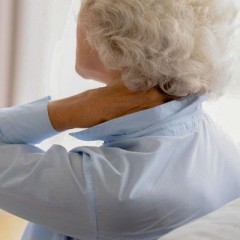NEWS
Letter From the Acting Director: New NIH Research Grants Honor Legacy of Former NIAMS Director Stephen I. Katz, M.D., Ph.D.
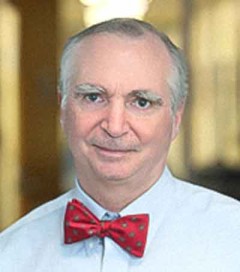
We at the NIAMS are excited as we look forward to the arrival of Lindsey Criswell as the new Director but our thoughts also turn back to memories of our previous Director, Steve Katz. He was a unique voice who guided the NIAMS as Director for more than two decades and who spent his career mentoring the next generations of researchers. With this in mind, I am pleased to share news of new awards that give the National Institutes of Health (NIH) a unique way to encourage the scientists of tomorrow. The awards are now accepting applications
Fiscal Year 2021 Funding Plan
The NIAMS is currently operating under a Continuing Resolution (CR) through December 18, 2020. The interim funding plan for research and training grants represents the most current information as of December 15, 2020.
COVID-19 Updates
COVID-19 is an emerging, rapidly evolving situation. Get the latest public health information from the Centers for Disease Control and Prevention, and the latest research information from the NIH. Additional news and resources include:
- U.S. Department of Health and Human Services Launches COMBATCOVID Website as Centralized Information Resource
- Treatments for People With Early COVID-19 Infection Is an Urgent Research Focus
- Can Autoimmune Antibodies Explain Blood Clots in COVID-19? (NIH Director’s Blog)
- U.S. Food and Drug Administration (FDA) Authorizes Monoclonal Antibody for Treatment of COVID-19
- FDA Authorizes First COVID-19 Test for Self-Testing at Home
Researchers Uncover Clues to Why Some Wounds Don’t Heal
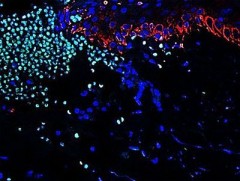
Researchers led by Maria Morasso, Ph.D., Chief of the NIAMS Intramural Research Program’s (IRP) Laboratory of Skin Biology and Marjana Tomic-Canic, Ph.D., of the University of Miami, have identified defects in the wound healing process that might explain why some wounds heal slower or not at all. The scientists also pinpointed a critical step in the pathway, the series of events contributing to wound repair, that might be a good target for developing new treatments for diabetic foot ulcers.
NIH Researchers Discover a New Inflammatory Disease Called VEXAS

Peter Grayson, M.D., Head of the NIAMS IRP’s Vasculitis Translational Research Program and Associate Director of the NIAMS Fellowship Program, and Dan Kastner, M.D., Ph.D., Director of the NIH’s National Human Genome Research Institute (NHGRI) Division of Intramural Research led an international team of researchers toward discovery of a new, adult-onset inflammatory disease abbreviated the VEXAS (vacuoles, E1 enzyme,X-linked, autoinflammatory, somatic) syndrome.
NIH Awards $35.5 Million to Use Tiny, Bioengineered Organ Models to Improve Clinical Trials’ Development and Design
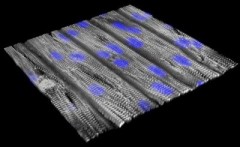
A NIAMS grant for Clinical Trials in a Dish Using a Personalized Multi-Tissue Platform for Atopic Dermatitis is among the grants issued to support researchers’ efforts in using tiny, bioengineered models of human tissues and organ systems to study diseases and test drugs.
Closing in on the Circuitry of Chronic Itch: Genetic Studies Illuminate Neuronal Chemical’s Role in Pain and Itch
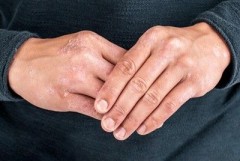
Mark A. Hoon, Ph.D., of the NIH’s National Institute of Dental and Craniofacial Research (NIDCR), led a team that studied neurons involved in itch, looking particularly at a hormone called somatostatin. Their studies of the complex system producing itch sensations may lead to treatments for people whose chronic itch is based on abnormal immune response to skin damage as opposed to itch that is based on histamine molecules that can be blocked by antihistamine medications.
Comparing the Neural Effects of Placebo Pain Relief in Fibromyalgia Patients and Healthy Individuals
Although fibromyalgia is associated with changes in brain function and neural pathways, researchers saw no differences in responses to placebo pain relief between fibromyalgia patients and healthy volunteers in a study funded by the NIH’s National Center for Complementary and Integrative Health (NCCIH).
- Study Provides New Insights Into Changes in Brain Function in Fibromyalgia
Funding Opportunities
Stephen I. Katz Early Stage Investigator Research Project Grant (R01 Clinical Trial Not Allowed) (PAR-21-038)
This Funding Opportunity Announcement (FOA) supports an innovative project that represents a change in research direction for an early stage investigator (ESI) and for which no preliminary data exist. This FOA is for basic science experimental studies not involving humans. First due date: January 26, 2021
Stephen I. Katz Early Stage Investigator Research Project Grant (R01 Basic Experimental Studies With Humans Required) (PAR-21-039)
This FOA supports an innovative project that represents a change in research direction for an ESI and for which no preliminary data exist. This FOA is for basic science experimental studies involving humans. First due date: January 26, 2021
Late-Stage Translation of Biomedical and Behavioral Research Results in Arthritis and Musculoskeletal and Skin Diseases From Academic/Nonprofit Lab to Marketplace (SBIR [R43/R44] Clinical Trial Not Allowed) (PAR-21-030)
This FOA solicits Small Business Innovation Research (SBIR) grant applications from small business concerns that translate technology and therapeutic innovations from academic and other nonprofit research sectors to the marketplace to advance the development of diagnostic and prevention tools or treatments for musculoskeletal, rheumatic or skin diseases. First due date: January 5, 2021
Helping to End Addiction Long-termSM (HEAL) Initiative: Non-addictive Analgesic Therapeutics Development [Small Molecules and Biologics] to Treat Pain (UG3/UH3 Clinical Trial Optional) (RFA-NS-21-010)
The purpose of this FOA is to support preclinical optimization and development of safe, effective and non-addictive small molecule and biologic therapeutics to treat pain. Upcoming due date: March 24, 2021
Stay Updated About Funding Announcements
If you would like information about grants and funding opportunities, subscribe to funding-dedicated email newsletters, including periodic NIAMS Funding Alerts and a monthly NIAMS Funding News email, and follow our new Twitter account (@NIAMSFunding) focused on funding opportunities. Also check out the NIH Guide for Grants and Contracts, the primary source for information about NIH funding opportunities. You can also request a weekly Table of Contents from the NIH Guide. In addition, the NIAMS website provides comprehensive information on NIAMS-related grants and processes.
Resources
Spotlight on Scientific Imagery: Stem Cells Growing on Woven Scaffold
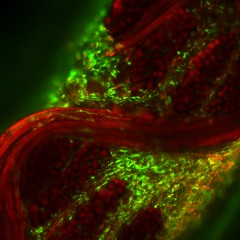
This image shows stem cells (stained green) growing throughout the pores of a three-dimensional, biodegradable, woven scaffold (stained red), which was designed to fit over the ball of the patient’s hip joint. The stem cells were taken from fat beneath the skin and were seeded onto the scaffold. Using a cocktail of growth factors, the stem cells were coaxed into turning into cartilage cells, where they regenerated cartilage throughout the woven scaffold, while the scaffold slowly dissolved. The newly formed cartilage can be used to completely resurface an arthritic joint.
Discover What’s New on the NIAMS Community Outreach Website

Visit the recently updated Health Resources for Community Outreach website from the NIAMS for free health resources about bones, joints, muscles and skin to use in outreach and health education efforts. Check back often for updates. The NIAMS continually updates related health topics, with the goal of providing the most up-to-date health information possible.
Derm Germs: The Human Skin Microbiome

In this podcast (click on transcript to read), Heidi Kong, M.D., M.H.Sc., Head of the NIAMS IRP’s Cutaneous Microbiome and Inflammation Section of the Dermatology Branch, and Ian Myles, M.D., M.P.H., Head of the Epithelial Therapeutics Unit in the National Institute of Allergy and Infectious Diseases’ (NIAID) Intramural Program, discuss the skin microbiome; its relationship to eczema, an inflammatory skin disorder—and atopic dermatitis, a form of eczema; and a recent clinical trial led by Dr. Myles to assess the safety and potential benefit of a lab-grown gram-negative bacteria, roseomonas, used in a spray to help heal the skin of people with eczema.
We invite you to subscribe to the NIAMS Community Outreach Bulletin, which is an online digest designed to inform community advocates and health professionals about resources for diverse audiences on conditions of the bones, joints, muscles and skin and ways to stay healthy. The NIAMS also publishes the Honoring Health: Resources for American Indians and Alaska Natives e-newsletter, which is distributed three times per year and highlights a different health topic for each issue, along with helpful resources for community members and health professionals.
EVENTS
January NIAMS Advisory Council Meeting (Virtual Meeting)
The next NIAMS Advisory Council Meeting will be held virtually on January 26, 2021. This meeting will only be available for viewing via the NIH videocasting service. The meeting agenda will be available here.

NIH Director’s Wednesday Afternoon Lecture Series
The NIH Director’s Wednesday Afternoon Lecture Series offers weekly lectures every Wednesday at 3 p.m. ET. Renowned scientists from around the globe present research weekly on a variety of topics. The lectures are continuing medical education certified, open to the public and available live via webcast.
NIH Science Lectures and Events Available via Internet
For additional online science seminars and events hosted by the NIH, view the NIH calendar, which notes videocast events with a video icon ![]() .
.

